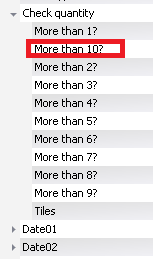Difference between revisions of "Using a Databox - Conditional Assessment"
From Keyfax Wiki
(Created page with "Home > Databoxes > Using a Databox - Conditional Assessments Using a Databox - Conditional Assessments As well as reading from a Databox (with the intention of writing the d...") |
|||
| Line 1: | Line 1: | ||
| − | + | As well as reading from a databox with the intention of writing the data to another location, you can also assess the data and use this to control the path that the script follows or perform some calculation. | |
| − | + | When creating a databox it is possible to define a conditional assessment against the values that will be stored in that databox. A conditional assessment uses an expression, so that the data is assessed against that expression and will return either '''True''' or '''False'''. To make an expression conditional, make sure the tick is visible in the '''Cond?''' column. | |
| − | |||
| − | |||
| − | |||
| − | When creating a | ||
| − | Example: | + | '''Example:''' Check if a quantity entered(in this example of a repair to wall tiles) is more than 10. |
| − | + | [[File:conditionalexample41.png]] | |
| − | |||
| − | |||
| − | |||
| − | |||
| + | [[File:quantittyexample41.png]] | ||
| − | + | [[File:exportreadexample41.png]] | |
| − | If for any reason the assessment of the data fails the ‘Otherwise’ path will be automatically taken. | + | If for any reason the assessment of the data fails the ‘Otherwise’ path will be automatically taken. |
Revision as of 14:51, 21 February 2018
As well as reading from a databox with the intention of writing the data to another location, you can also assess the data and use this to control the path that the script follows or perform some calculation.
When creating a databox it is possible to define a conditional assessment against the values that will be stored in that databox. A conditional assessment uses an expression, so that the data is assessed against that expression and will return either True or False. To make an expression conditional, make sure the tick is visible in the Cond? column.
Example: Check if a quantity entered(in this example of a repair to wall tiles) is more than 10.
If for any reason the assessment of the data fails the ‘Otherwise’ path will be automatically taken.


